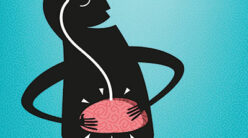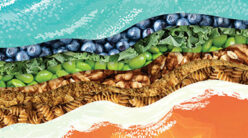When we eat while actually hungry, food tastes much better and we’re physiologically primed for proper digestion. Hunger, in the true sense of the word, indicates to us that it’s time to stop what we’re doing and nourish our bodies.
Consider that real hunger is not often experienced in our modern, overfed population. Most people no longer remember or are aware of what hunger feels like. Most are surprised to learn that it’s a sensation felt in the throat, not in the head or stomach.
Instead of true hunger, what people are experiencing are detoxification or withdrawal symptoms. They feel shaky, headachy, weak, or suffer from abdominal cramps or spasms. They conclude that these are hunger symptoms because eating relieves them. I call this persistent imposter “stress hunger.”
Stress hunger is created by the symptoms a person experiences that are due to toxic wastes being mobilized for elimination. It occurs after a meal is digested and the digestive track is empty. It can make us feel very uncomfortable.
Generally, we eat to get rid of these withdrawal symptoms, and it works. In fact, this is one of the most important contributors to our population’s overweight condition. We eat the wrong foods and, just a few hours later, feel ill, stressed out, shaky, weak, and mentally dull. So, what do we do? We eat again to relieve the discomfort, and an obesity-creating cycle continues to evolve.
Did you ever hear someone saying they needed to eat because they felt shaky? The bigger question is: are these symptoms true hunger, hypoglycemia, or something else all together? I’ve concluded that such symptoms occur simultaneously as our blood sugar decreases, but they don’t indicate hypoglycemia. Rather, they result from tissue sensitivity to the mobilization of waste products, which occurs when most active digestion is completed.
Don’t Deny Yourself
Let me reassure you that I don’t want you to go hungry and deny yourself food to achieve an ideal weight. However, there is another answer.
When we eat a nutrient-dense diet filled with an abundance of colorful vegetables, we better meet the nutrient needs of our body. This higher quality of food will reduce and eliminate those uncomfortable “withdrawal” symptoms. High-nutrient eating enables us to better deal with all types of stress. But, in this case I’m suggesting that eating more high-nutrient foods will also enable us to avoid “stress hunger” and not experience the cravings that drive us to overeat.
When our diet is low in nutrients, we build up intracellular waste products. The moment our digestion stops, our body goes through a period of “cleaning,” meaning that our tissues release toxic substances into circulation for removal. Our cells dutifully store these toxic products that build up in the body.
Phytonutrients (found in phytochemical-rich vegetation) are required for the body to properly detoxify these metabolic waste products. They jump-start the cellular detoxification machinery. When we don’t eat sufficient phytochemical-rich foods and consume excess animal proteins—which creates additional nitrogenous wastes—we often intensify the buildup of metabolic byproducts in our body.
The confusion is compounded because we eat the same heavy foods that were causing the problem to begin with. Yes, we feel so much better. But this makes becoming overweight inevitable, because if we stop digesting food, even for a short time, our bodies will begin to experience those uncomfortable symptoms of detoxification or withdrawal from our unhealthful diet. To counter this we eat heavy meals too often, which keeps our digestive track overfed and overstressed.
Addiction and Withdrawal
When our bodies have acclimated to noxious agents, its called addiction. If someone who’s addicted to heroin tries to stop taking the drug, he or she feels ill. In fact, if more heroin isn’t immediately forthcoming, they become terribly sick. This is called withdrawal.
When we stop doing something harmful to ourselves—even if that harm was done by the food we eat—we feel ill as the body mobilizes cellular wastes and attempts to repair the damage caused by the exposure to the toxins.
For instance, if we drank three cups of coffee or caffeinated soda each day, we’d experience a withdrawal headache when our caffeine level dipped too low. We could take in more caffeine (or other drugs), or we could eat food more frequently which would make us feel a little better as it retards detoxification or withdrawal. In other words, the caffeine withdrawal symptoms can contribute to our drinking more caffeine products or eating more frequently as a means of managing the symptoms from caffeine withdrawal.
Likewise, a few hours after eating the standard low-nutrient diet, most people begin to feel “hungry.” They feel weak, headachy, tired, mentally dull, and have stomach spasms. This “stress” or “toxic hunger” only occurs in those who have been eating a toxic diet. True hunger would not have occurred so early after the meal.
The Real Deal
True hunger signals when our body needs calories to maintain our lean body mass. If we ate food demanded by true hunger and true hunger alone, we’d never become overweight.
In our present toxic food environment, we have lost the ability to connect with the body signals that tell us how much food we actually need. We’ve become slaves to withdrawal symptoms and eat all day long, even when there is no biological need for calories.
Fortunately, this cycle of eating, and then avoiding the symptoms of detoxification by eating again, doesn’t have to continue. There’s a way out. When you restore the nutritional integrity and relative cleanliness to your tissues, you simply will not have the desire to eat as a way to rid your body of those toxin-induced symptoms.
In an environment of healthy food choices, we’d not feel any symptoms after a meal until the hormonal and neurological messengers indicated that the glycogen reserves in the liver were running low. Nature has made it so our body has the beautifully orchestrated ability to give us precise signals telling us exactly how much to eat in order to maintain an ideal weight and enjoy long-term health. I call this signal “true hunger.”
True hunger is felt in the throat, neck, and mouth, not in the stomach or head. It’s a drawing sensation and not at all uncomfortable. It makes food taste much better when you eat, and makes taking in nourishment an intense pleasure.
True hunger requires no special food to satisfy it. It’s relieved by eating almost anything. We can’t crave some particular food and call it hunger. A craving, by definition, is an addictive drive, not something felt by a person who’s not an addict. Keep in mind that almost all Americans are addicted to their toxic habits. A disease-causing diet is addicting. A health-supporting diet is not.
Ideal Weight
In order to achieve an ideal weight and consume the exact amount of calories needed to maintain a lean body mass, we don’t have to carry around a calculator and scale to figure out how much to eat. A healthy body will give us the correct signals. So in order to achieve superior health, maximize our longevity potential, and achieve our ideal weight, we have to eat healthy enough to get back in touch with true hunger and rid ourselves of this “stress hunger.”
In my book, Eat To Live I explain how eating for health is the most effective way to reach our ideal weight and stay there permanently. There are many ways to lose weight, but only by eating lots of nutrient-rich foods as a method of choice for weight loss will we enjoy not having to fight off cravings and ill feelings.
In most portion-controlled, calorie-counting diets, it’s likely that the body will not receive adequate fiber or nutrients. The body will have a compounded sensation of hunger and craving which, for most, is simply overwhelming. It invariably results in people losing weight, then gaining it back.
Diets based on portion control and calorie counting generally permit the eating of highly toxic, low-nutrient foods which forces us to fight our addictive drives as we attempt to eat less. This combination undernourishes the body, resulting in uncontrollable and frequent food cravings.
Without an adequate education in superior nutrition, and the solid principles to make them stick, these unfortunate individuals are forced to flounder and fail, bouncing from one diet to another, always losing a little and then regaining often more than they lost.
Prioritize Our Food Intake
We must prioritize our food intake around nutrient-dense, high-fiber, high-water-content foods. That means fruits, vegetables, and beans. To maintain superior health and our ideal weight, we must know how to seek nutritional excellence in spite of our misinformed and confused population.
It’s all about knowledge, not willpower. With the right knowledge base, we can generate more pleasure from eating and—at the same time—protect our precious health. Don’t diet. Eat to live.






